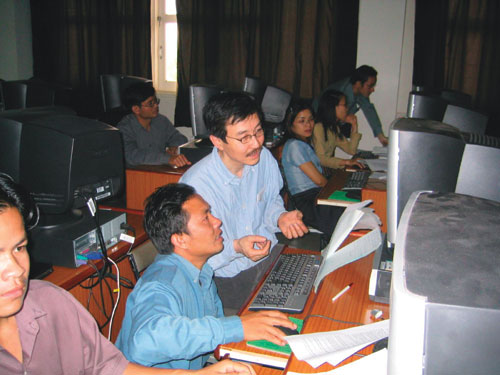Japan's Official Development Assistance White Paper 2005
Main Text > Part II ODA DISBURSEMENTS IN FISCAL YEAR 2004 > Chapter 2 Details and New Policies about Japan's ODA: Striving for Further ODA Reforms > Section 5. Formulation and Implementation of ODA Policy > 2. Increasing Public Participation > (2) Human Resource Development and Development Research
(2) Human Resource Development and Development Research
A. Human Resource Education
Due to the increasing diversity and complexity of development issues, recruiting and developing personnel who possess sophisticated knowledge, abundant experience, and foreign language communication skills is essential today for effective and efficient implementation of international assistance activities.
This growing need for highly educated and experienced human resources has prompted a response from the Foundation for Advanced Studies on International Development ( FASID ), which was established in 1990 to serve as an organization for promoting the concept of an International Development University. FASID has conducted training programs aimed at personnel involved in assistance, programs for overseas dispatch of researchers, and research projects, among others. In April 2002, in cooperation with the National Graduate Institute for Policy Studies ( GRIPS ), FASID established a joint international development program in the master's course of this university, and established a doctoral course for the same program in April 2002. FASID has also dispatched lecturers to university departments or for lectures concerning development cooperation offered in a number of universities.

Attempts to utilize the knowledge of universities for the sake of international cooperation is progressing gradually (Laos: The Upgrading IT Education Project (Information Technology Bridging Course)) (Photo: JICA)
JICA has also been extensively involved in human resources development through the administration of various programs. It has conducted trainings and seminars concerning the latest assistance trends, technical transfer methods, and foreign languages, as well as programs for acquiring actual assistance experience both within Japan and abroad. It has also provided training for assistance personnel, ranging from young junior specialists to international cooperation specialists who already possess a certain degree of specialization and experience. These efforts are expected to promote human resources development to meet the immediate staffing needs of NGOs, international agencies, and other organizations outside of Japan's ODA projects as well.
In addition, the JICA International Cooperation Personnel Registration System has been established to provide an effective means of recruiting and utilizing motivated personnel with specialized skills. This system provides information on job openings, staff registration, and information on various types of training and seminars not only related to JICA, but also to NGOs and international agencies.
B. Research and Development
In order to provide effective and efficient assistance, it is also essential to clearly ascertain the needs of developing countries and assistant trends in the international community. For this reason, efforts are being directed toward research studies and the application of knowledge acquired through such studies.
At JICA, research associations have been organized that consist primarily of people affiliated with JICA and, if it is needed, ask for the knowledge of outside experts from universities, research organizations, and the like. These associations pursue two principal areas of research concerning development and assistance: (1) Project strategy research, which provides analysis and advice for the establishment of project strategies in new fields and conducts analysis of assistance trends and conceptualization of development theory; and (2) Research on assistance methods, which systematizes project experience through case studies and considers assistance management methods. In FY2004, the JICA Institute for International Cooperation conducted a total of 27 research projects, including the research study of "capacity development," an assistance approach that is becoming the mainstream recently, and a study titled, "Supporting Capacity Development for Solid Waste Management in Developing Countries," which compiled assistance in the area of waste management based on that perspective.
JBIC is also committed to research on development assistance and development policies by inviting guest researchers, fostering collaborations with the World Bank and other international organizations, and performing joint research with Japanese and foreign researchers. For example, JBIC has been actively involved in various international conferences, including a symposium in Tokyo based on the joint study, "Connecting East Asia: New Framework for Infrastructure," which was co-hosted with the World Bank and the ADB, the "Tokyo Forum on the Operational Dimensions of Supplying Regional Public Goods through Regional Public Development Assistance," which was co-hosted with the Inter-American Development Bank ( IDB ) and ADB, the "Africa Economic Outlook Seminar" held in collaboration with the OECD Center, and the Japan-Latin America economic exchange symposium, "Japan-Latin America Global Partnership."
In further efforts, the International Development Cooperation Support Center project was launched in July 2003 in order to promote collaboration among universities and aid-related organizations so that the intellectual resources of Japanese universities may be widely utilized in international cooperation. The scope of this project includes promotion of information sharing among universities and aid-related organizations, the holding of various seminars, and the creation of databases of universities and educators with an interest in international cooperation with a view to developing an environment for universities to participate in international cooperation through commissioned international cooperation projects and the like.


 Next Page
Next Page